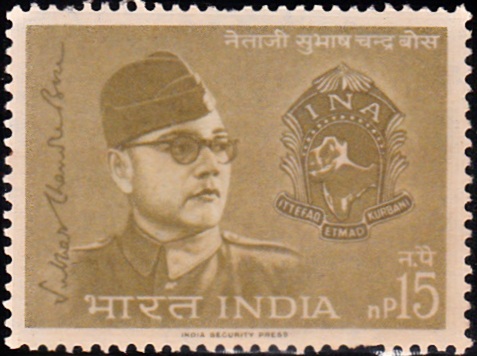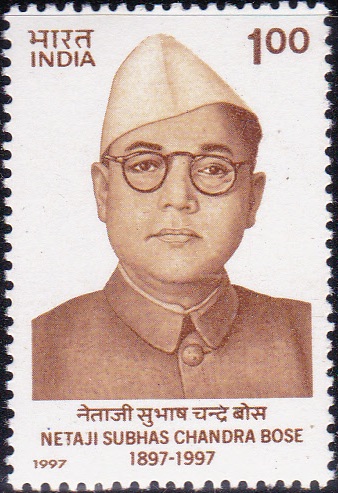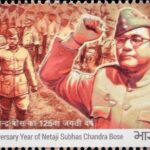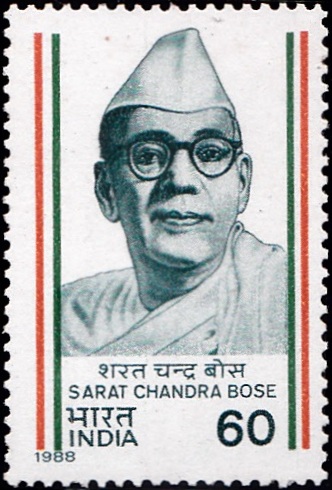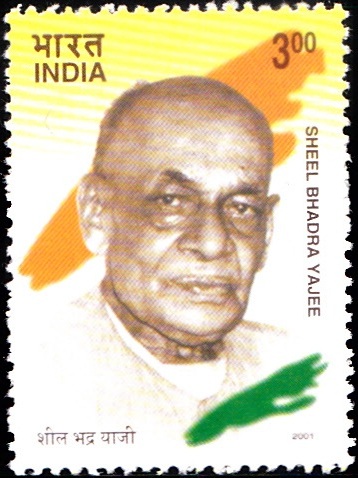
Netaji Subhas Chandra Bose 1964
Complete Set of 2 nos of commemorative postage stamps on the 67th Birth Anniversary of Subhas Chandra Bose, an Indian Bengali freedom fighter, politician and revolutionary, spearheaded Azad Hind Legion against British Imperialism :
Issued by India
Issued on Jan 23, 1964
Issued for : The Posts and Telegraphs Department deem it a privilege to issue two special stamps to offer their tribute to Netaji on his 67th birthday, when the entire nation joins in paying homage to the great leader.
“I am happy to know that the Department of Posts and Telegraphs is bringing out a set of special postage stamps in honour of the 67th birthday of Netaji Subhas Chandra Bose. He was a valiant fighter for the country’s freedom and undaunted by difficulties and hardships he carried on the struggle with exemplary courage and devotion. There can be no better tribute to him than the determination of our people to maintain the unity and integrity of the country irrespective of social, communal and other differences.“ – S. Radhakrishnan, Rashtrapati Bhavan, New Delhi-4, January 16, 1964.
Type : Stamps, Mint Condition
Colour : 15 n.p. :- Gold Green and 55 n.p. :- Blue Black & Crimson
Denomination : 15 & 55 naya Paise
Overall size : 3.91 x 2.90 cms.
Printing size : 3.63 x 2.62 cms.
Perforation : 13
Watermark : All over multiple ‘Lion Capital of Asoka’
Number of stamps printed : 2 million each
Set : 35 stamps per issue sheet
Printing process : Photogravure
Designed and Printed at : India Security Press
Name : Subhas Chandra Bose
Born on Jan 23, 1897 at Cuttack, Odisha, India
Died on — at —
About :
- In the history of India‘s epic struggle for freedom, the saga of Netaji Subhas Chandra Bose, his patriotism, sacrifice and gallantry will for ever be written in letters of gold.
- Born on January 23, 1897, the ninth child of a well-to-do family in Cuttack, Subhas Chandra Bose gave early evidence of an intrepid spirit. At the age of 17, he left home secretly on a lone trek of the Himalayas in quest of a spiritual guru, but returned home without finding one. The teachings of Ramakrishna Paramahamsa and Swami Vivekananda, however, gave him the inspiration and the solace he needed.
- He was brilliant in his academic studies both in India and England. At the age of 23, when he appeared for the Civil Service Open Competitive Examination in London, he was ranked fourth among successful candidates. But with characteristic courage he threw away the chance of what might well have been a notable career, when he resigned, and entered instead the stormy arena of a relentless struggle for liberation of the motherland.
- His words about the reason for this act of self-denial are typical of the man : “National and spiritual aspirations are not compatible with obedience to Civil Service conditions.“ Arriving in Bombay on July 16, 1921, he called on Mahatma Gandhi who had launched, by that time, the historic non-violent campaign, known as the Non-Cooperation Movement, for freeing the country of British rule. This meeting proved to be a turning point in the life of Subhas Chandra Bose. Of this significant phase of his life Gandhiji was to say, later, in touching terms :
“Netaji was like a son to me. I came to know him as a lieutenant full of promise under the late Deshbandhu Das…… He preferred selfless service to selfish ambition.”
- From then on, Subhas Chandra Bose rose steadily in the galaxy of the nation’s leaders. Twice he became the President of the Indian National Congress, in 1938 and 1939. In the quarter of a century covered by his public life, during which he had become the stormy petrel of the Indian National Congress, Subhas Chandra Bose gathered round him the nation’s youth inspired by revolutionary zeal and fire. The British authorities tried to crush him by throwing him into prison nearly a dozen times. But this only steeled him further for the ultimate defeat of the Imperialist power. His uncompromising attitude to Imperialism and his open opposition to India’s participation in British war efforts led to his arrest by the British authorities after the outbreak of the Second World War. When, however, he started a ‘fast unto death’ in prison, he was released, but confined in his home in Calcutta and kept under close surveillance of the Secret Police. The story of his subsequent dramatic escape and his heroic exploits in the cause of the country’s liberation is best described in Gandhiji‘s words :
“Netaji by great strategy gave the slip to the guard put over him by the Government od Bengal, and by sheer courage and resourcefulness reached Kabul and passed through European countries and finally found himself in Japan, collected from scattered material an army of brilliant young-men drawn from all communities and from all parts of India, and dared to give battle to a mighty Government. A lesser man would have succumbed under the trials that Netaji went through, but he in his life verified the saying of Tulsidas that ‘all becomes right for the brave’.”
- This epoch of a gallant life dedicated to the country’s freedom has endeared him to the nation as ‘Netaji‘ and enshrined him in the hearts of millions of his countrymen.
- No greater tribute can be paid to this noble son of India than that from the Father of the Nation :
- “Netaji’s name is one to conjure with. His patriotism is second to none. His bravery shines through all his actions…
- “His was a life full of perilous adventure and romance. His daring was unequalled.
- “He has rendered a signal service to India by giving the Indian soldier a new vision and a new ideal.
- “The lesson that Netaji and his army bring to us is one of self-sacrifice, unity irrespective of class and community, and discipline. If our adoration will be wise and discriminating, we will rightly copy this trinity of virtues…. Then we will be able to stand erect before the world.“


